Theater / Film
Immersive ‘G7: 2070’ Puts Audiences Inside a Global Summit at The Kampong
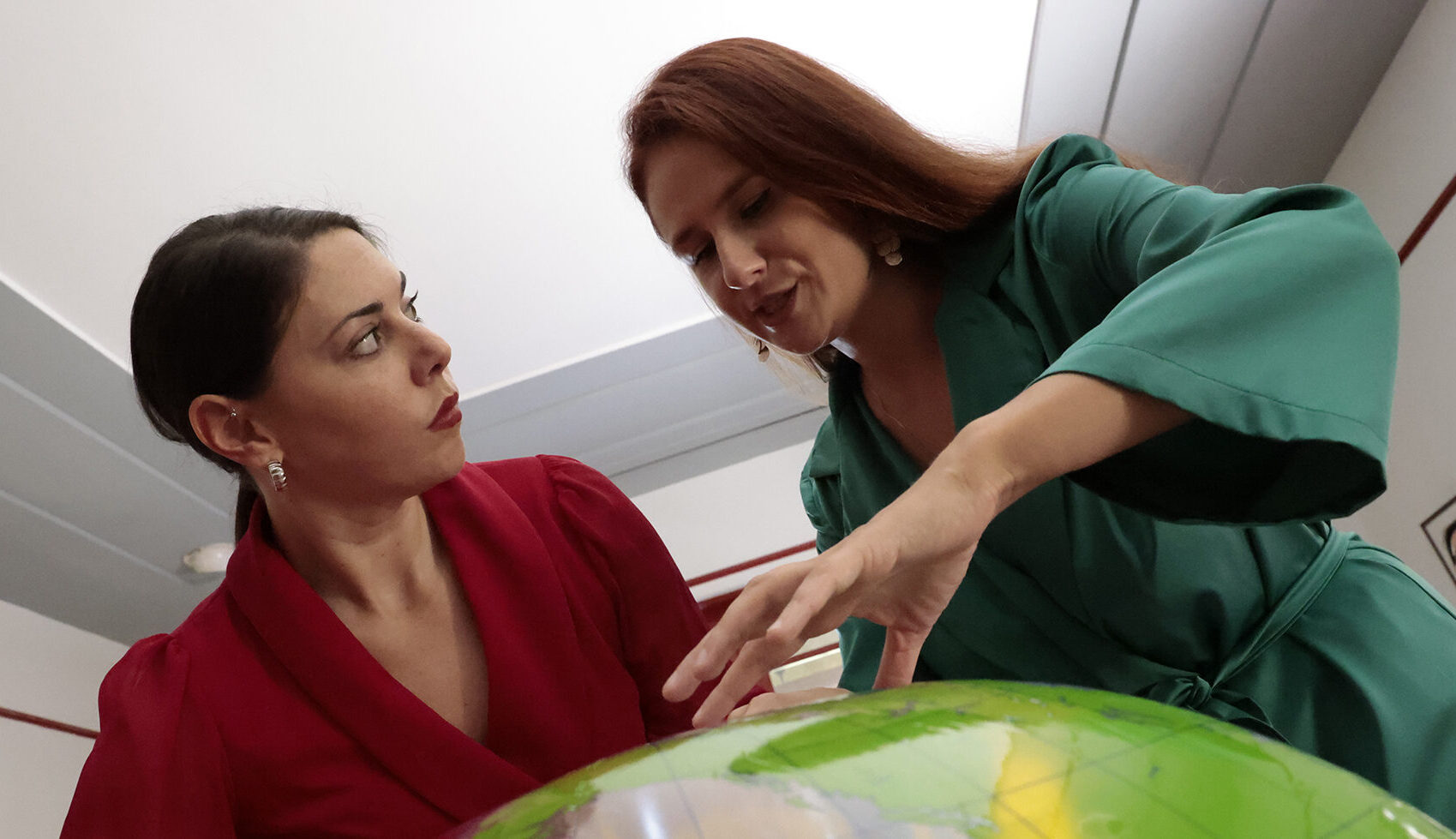
Anastasiia Perevozova as Russia’s Minister of Sport and former international figure skating star, left, and Amanda Ortega, President of the United States and Founding Sister of the new constitution, right, ponder the new world order in William Hector’s “G7: 2070” playing Thursday, Oct. 19, Friday, Oct. 20 and Saturday, Oct. 21 at The Kampong, Coconut Grove. (Photo courtesy of Ted Hartshorn)
Immersively performed in the nine-acre botanical garden The Kampong in Coconut Grove, William Hector’s theatrical summit “G7: 2070” puts audiences in Miami’s future. The year? 2070. The landscape? A post-sea-level rise Miami.
The playwright has imagined that audiences join the action as dignitaries of what are now the seven most powerful nations. Power has shifted and the nations aren’t what they used to be.
“Disney is now a nation,” says Hector. “You trade away your rights to the Mouse and you get a very good life. You may not have freedom of work or freedom of speech, but you have freedom of purpose. You have a story and isn’t that more important? According to them, ‘Yes’ ”, he says with all the vigor of someone premiering a play that’s been five years in the making.
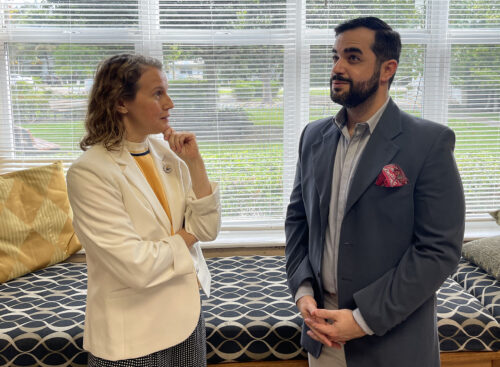
Elizabeth Price as Leslie Kimball, President of the Disney Nation and
Michael Ferreiro as Thiago Alfonso, President of Uruguay in William Hector’s original immersive play, “G7: 2020” (Photo courtesy of Patrick Rodriguez)
In 2018, Hector submitted his idea for the inaugural Knight New Work grant. It was an open call to artists, according to the Knight Foundation, “to celebrate innovative ideas that embodied the diverse essence of Miami.” His immersive theatrical summit set in a flooded Miami was awarded $75,000. He hopes this three-day premiere at The Kampong is only the beginning. He’d like “G7: 2070” to have a continuous run somewhere much like Miami’s “The Amparo Experience” did — eight months in 2019.
For the first iteration, admission is “pay as you will” with no set charge. “I wanted the show to be accessible to students and other people new to immersive theater,” says Hector. And be prepared to walk the grounds, too, as the action takes advantage of the beautiful and historic The Kampong. Hector says theater attire here is comfortable clothes and shoes.
The cue for the play is taken from the real intergovernmental political forum, the G7 (Group of Seven). Initially, France, Italy, Japan, the United Kingdom, the United States and West Germany formed the Group of Six in 1975. The next year, Canada joined the “World Economic Summit” as a global forum for the most powerful nations to discuss crises affecting the world economy. In 1997, Russia joined, creating the G8, but that country was suspended in 2014 after annexing Crimea from Ukraine.
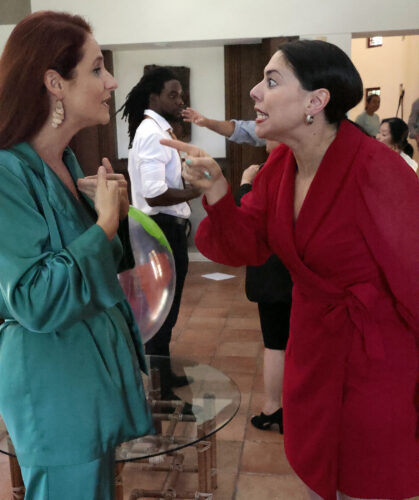
Anastasiia Perevozova as Russia’s Minister of Sport and former international figure skating star, left, and Amanda Ortega, President of the United States, right, in a heated exchange in William Hector’s “G7: 2070.” (Photo courtesy of Ted Hartshorn)
Russia is, however, included in Hector’s futuristic G7 where the nations have met to decide the fate of the world amid a climate crisis. Hector’s explanation of Russia’s current status is that they are “surviving and thriving through hell and high water.”
Joining The Walt Disney Nation and Russia are the United States, China, Ethiopia, Uruguay and The European Papal Federation headed by 25-year-old Pope Joan II (played by Rachel Eddy).
“China is at the top of the world, but it’s not easy being there. There are challenges being the kingpin,” says Hector. China’s Paramount Leader is Song Xiaoyuan (played by Gwen Lai), a cautious pessimist along with Ning Baoshun, China’s premier (played by Helen Wu), the yin to Xiaoyuan’s yang, described as an enthusiastic optimist.
The U.S. has almost collapsed but it has been the underdog before, according to Hector. Uruguay is now the world’s financial capital. Ethiopia has humanity as its origin and it is the future in Hector’s reimagining of world order.
“Part of the inspiration (for the play) was the 1994 Summit of the Americas,” says Hector, born in Coconut Grove — the Ransom Everglades and University of Miami grad vows he never wants to leave the area.
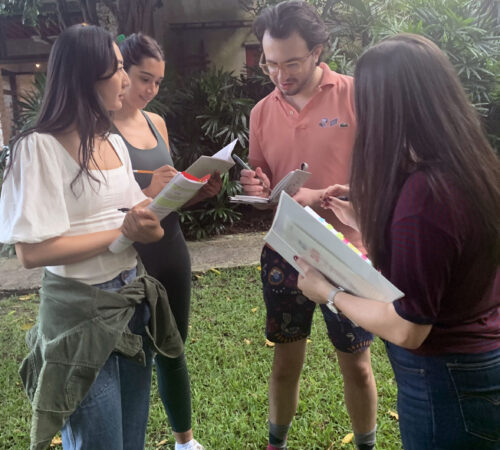
In rehearsal at The Kampong with playwright William Hector, center, for his play “G7: 2020.” From left, Helen Wu, Adriana Santos and Rachel Eddy. (Photo courtesy of Joanna Lombard)
In the 1994 summit, held in Miami and convoked by President Bill Clinton to engage with the countries of Latin America, leaders agreed to a series of initiatives in support of the four Summit themes — strengthening democracy, promoting economic prosperity, eradicating poverty and discrimination, and guaranteeing sustainable development.
Here in 2070 at The Kampong, just four miles away from where the 1994 Summit was held at Vizcaya, “the idea is that Miami is absolutely flooded and the countries have now returned. . . . now we’ve gone so far past the point of no return. If we’re doing this 50-plus years in the future then climate change is going to be the dominant theme,” says Hector.
Behind the scenes at this fictional 2070 conference, the heads of each country are jockeying for power, which is where the drama comes in.
“There are costs and consequences – who is going to choose for the good of the world or for the good of their own country,” says Hector.
Victoria Collado, the director behind Miami’s “The Amparo Experience,” which took its audiences back in time to 1958 Havana, says with “G7: 2070” she worked on creating the tension so prevalent in Hector’s play. “ . . .What these countries want and how they are going after getting it. Really giving the audience the experience that they have a say over the rest of the world,” she says.
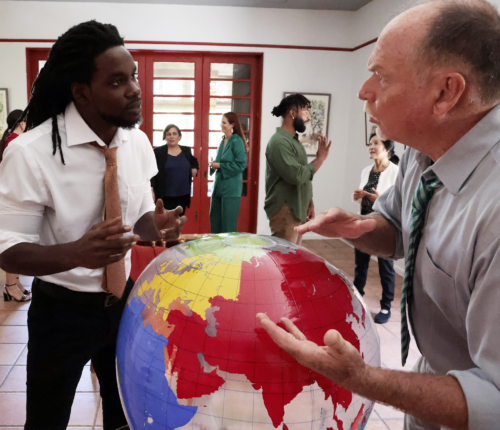
Jarryd Arden as The Federal Democratic Republic of Ethiopia’s minister of peace, left, and LeoRising Scott as the Prime Minister of The Federal Democratic Republic of Ethiopia in William Hector’s “G7: 2020” at The Kampong. (Photo courtesy of Ted Hartshorn)
Hector saw “The Amparo Experience” at least eight times, he says, to absorb that immersive play and figure out “what the different modes were that worked.” One of the most important, he says, was that the audience should always feel like they are a character in the play.
“You can be the fly on the wall or you can become totally immersed. If you are talkative, you will have an amazing time. If you are more on the shy side, you’ll still feel like ‘wow, I was included.’ ”
But he pulls no punches when he says it is a high-stakes game albeit with humor as two actors, each portraying the leader of a country, guide audiences through speeches, meetings, schemings and plottings.
The structure of the play puts 12 to 14 audience members, a.k.a. dignitaries, in each country’s group. There are 14 cast members in the play, two representatives for each country. The machinations are that each group is in a “segment” and they are split into four to five scenes happening simultaneously — so while the Uruguay group is being taken one way by its leaders, perhaps Ethiopia is gathering its delegates in another area. At times, the groups all converge, for instance, for speeches in the great hall. Dialogue may have the head of one country trying to convince the “delegate” of another why their country wield more power.
During the ticket process (there is no admission fee), participants pick which country they want to be included in or take the choice of “let the producer decide.”
“Disney was the most popular, then ‘let the producer decide’ came in second,” says Hector.
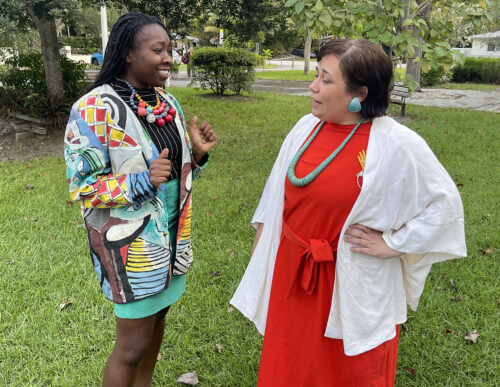
Fedleine Jerome as Dalia Mack, US Green Energy Billionaire, left, and Melissa Almaguer as playing Dr. Laura Olivera, Uruguayan Minister of Foreign Relations are two of the 14 actors in William Hector’s “G7: 2070.” (Photo courtesy of Patrick Rodriguez)
“It’s a gigantic undertaking,” admits Collado, who would know thanks to “Amparo.”
“Every writer has their own iambic pentameter,” she explains. “And William’s text is so specific and it is so fast so that it needs to be performed in a specific way.”
She says the play is firm on reality even though it is set in the future.
“It really is about making audiences be in love with what’s happening with the text. I want them to be invested in the summit. I want them to be on the edge of their seat.”
Or, in this case, on the edge of their feet.
WHAT: William Hector’s “G7: 2070”
WHERE: The Kampong, National Tropical Botanical Garden, 4013 Douglas Road, Miami
WHEN: 7 p.m. Thursday, Oct. 19, Friday, Oct. 20 and Saturday, Oct. 21
COST: Free (sold out, waitlist available)
INFORMATION: g72070.com. The production is also accommodating those who may not be able to stand or walk for long periods of time. Email: g72070@gmail.com.
ArtburstMiami.com is a nonprofit media source for the arts featuring fresh and original stories by writers dedicated to theater, dance, visual arts, film, music and more. Don’t miss a story at www.artburstmiami.com.
